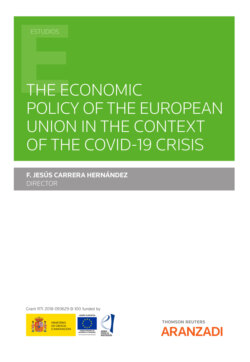Читать книгу The economic policy of the european union in the context of the covid-19 crisis - Francisco Jesús Carrera Hernández - Страница 17
На сайте Литреса книга снята с продажи.
3. GENERAL ASSIGNMENT
ОглавлениеIt is given as a power to contribute to the balanced and stable development of the internal market in the interest of the Union, using its own resources (art. 309 of the TFEU). The search for its contribution to the development of EU regions has been one of the main purposes of the EIB’s role over all these years. This means that it is committed to supporting the policies of the Member States. For this, the above precept establishes that it must resort to the capital markets and its own resources.
In this situation, the EIB must facilitate, through the granting of loans and guarantees, but without pursuing profit-making purposes, otherwise, it would lose the purpose for which it was created, which is to contribute to the development of the EU countries without focusing on the goals pursued by a common financial institution. This must provide financing in all sectors of the economy and to projects with the following three characteristics:
a) To contribute to the development of the more backward regions.
b) To pay attention to the modernization or reconversion of companies or to the creation of new activities resulting from the establishment or operation of the internal market that, due to their size or nature, cannot be fully financed by the various means of financing available in each of the Member States.
c) To contribute to the common interest of several Member States which, due to their size or nature, cannot be fully financed by the various means of financing available in each of the Member States.
Although the characteristics of the projects should be a justification aimed at contributing to the growth of European regions requiring economic development, they have nevertheless become a seemingly subjective matter to be assessed for funding approval. Also, in view of the need for permanent modernization of companies so that they have adequate inputs to continue operating optimally, it is necessary to resort to this type of financing; otherwise, they would lag in terms of competitiveness. Finally, the lack of financial resources makes it necessary to resort to these solutions in order to supplement the capital, as the States are sometimes unable to finance themselves completely and must therefore turn to the EIB. However, in order to fulfill its mission, the aforementioned provision determines that the EIB must facilitate the financing of investment programs in combination with the actions of the structural funds and other financial instruments of the Union.
It is necessary to emphasize that there are principles and responsibilities related to development, sustainability, respect for human rights and social commitment in which the EIB is fully involved and on which it has continued to work.
Regarding monetary support, according to the EIB Protocol, each EU country is allocated a capital, subscribed by the Member States. Each country is responsible for its share of capital subscribed and not disbursed. This fee can be increased with the unanimous approval of the Board of Governors19. Each country of the Union has an assigned amount: Germany, France and Italy have the same amount, which reaches 37,578,019,000 euros; followed by Spain, which has 22,546,811,500 euros; Belgium and Countries, with 10,416 365,500 euros; Sweden, Denmark and Austria, with a figure that barely exceeds five billion. For the rest of the countries, the figure is lower, with Malta being the one with the lowest number, which amounts to 98,429,500 euros.
The EIB borrows money on capital markets and grants concessional loans to projects that contribute to EU objectives. About 90% of loans are granted within the EU. Not a single euro comes from the EU budget.
The EIB offers three main types of products and services:
• Loans: about 90% of its total financial commitment. The Bank offers credit to clients of all kinds to support growth and employment, and this support often helps to attract other investors.
• Blended finance: allows clients to combine EIB financing with other investments.
• Advice and technical assistance: to achieve maximum profitability20.
In terms of the amounts it offers, the EIB grants loans above 25 million euros directly. For smaller loans, it opens lines of credit to financial institutions, which, in turn, lend the money to creditors21. As can be seen, large amounts are allocated to the countries of the Union. In addition, the products and services are clearly determined, particularly the advisory work and technical assistance to enable them to make use of profitable financial options.
